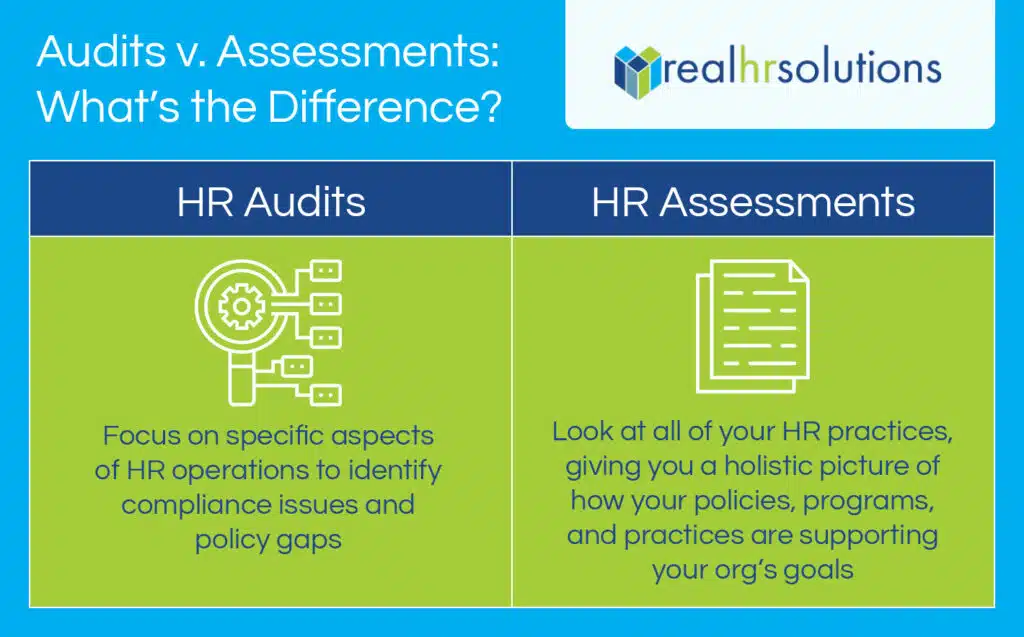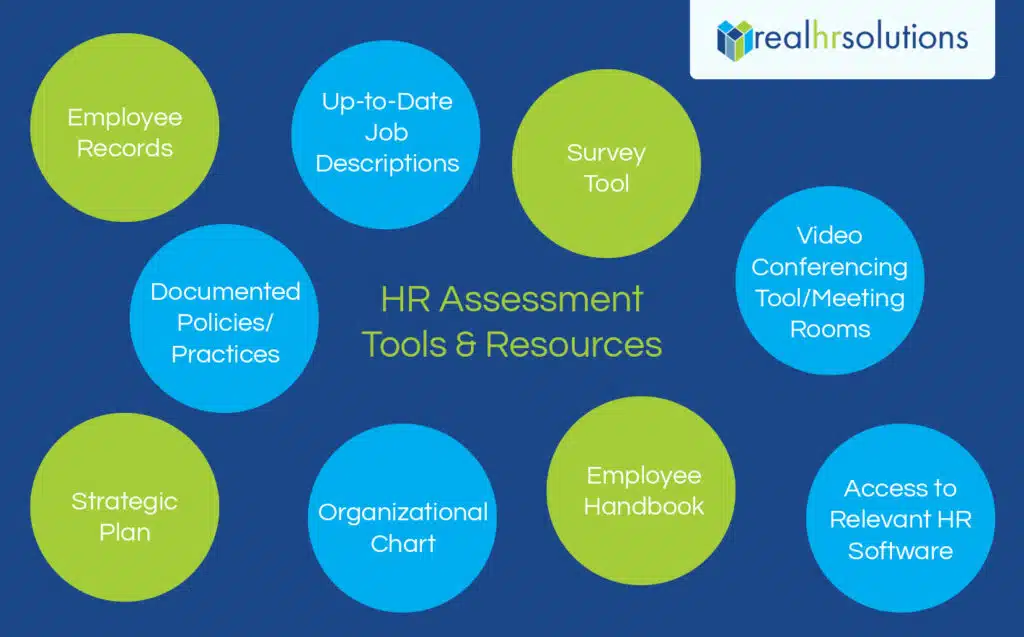HR Assessments 101: What You Should Know & How to Begin
Picture this: a mid-sized organization long praised for its innovation and customer-centric approach suddenly finds itself dealing with unexplained high turnover rates, declining employee morale, and a disengaged workforce. Human Resources (HR) and leadership have observed these new trends and want to reexamine the organization’s HR policies and practices to ensure cultural alignment, but a deep dive takes time, and the current HR department is occupied with trying to hire new staff to fill vacant positions, assisting staff with open enrollment, and day-to-day employee relations management.
Perplexed by these trends, leadership decides to look for external solutions to review their tactical and strategic HR policies, programs and practices, initiatives, and files to pinpoint areas for improvement that will pave the way for sustainable growth, enhanced employee well-being, and organizational success.
At RealHR Solutions, we have many clients in this same position. They’re ready to conduct an HR Assessment but don’t know where to begin. We generally begin by framing our discussion explaining the What, Why, When, and Who for them to develop an understanding of the essentials. From there, we discuss the reasons for, the resources available, and the commitment to the HR Assessment and its results.
To help any organization looking for guidance on these critical HR analyses, we have compiled the fundamentals into a quick guide covering these topics:
- HR Assessment: Frequently Asked Questions
- 15 Key HR Questions for HR Assessments
- How to Prepare for an HR Assessment: Tools, Resources, and Next Steps
An organization’s HR practices have a significant impact on its health and continued growth. Businesses should evaluate everything from compliance to HR policies and practices, additional HR services needed, how HR fits into its broader strategic goals—and the importance of periodically conducting HR Assessments. A solid understanding of your HR practices and services will not only help you avoid potential liabilities but also help you manage your people resources more effectively.

HR Assessments: Frequently Asked Questions
Whether you’re a business leader, HR professional, or individual seeking to examine HR’s impact on organizational effectiveness, these HR Assessment questions and answers will explain the intricacies you need to understand.
By exploring key concepts, benefits, and indicators that signal the need for an Assessment, we aim to empower you with the insights necessary to make informed decisions and drive positive change within your organization.
What is an HR Assessment?
An HR Assessment is a comprehensive review and evaluation of the human resources services that are delivered to an organization. An HR Assessment:
- Provides a strategic and operational analysis of existing workplace policies, programs, and practices.
- Evaluates the compliance and effectiveness of those policies, programs, and practices.
- Evaluates the structures and competencies of an HR department’s workflow, roles, and responsibilities.
- Addresses the strengths and gaps in service and how those services align with the needs of the employees and the goals of the organization.
- Provides actionable recommendations for measurable change and best practices.
HR Assessments vs. HR Audits

Compared to HR audits, HR Assessments are broader in scope. While audits focus on specific aspects of an organization’s HR operations to identify compliance issues and policy gaps that need addressing, Assessments look at all of your HR practices. These not only encompass compliance and liability concerns but also how well all the elements of your policies, programs, and practices work together to support organizational goals.
Why conduct an HR Assessment?
An HR Assessment can be a valuable way to determine whether HR needs are being met in an organization:
- Compliance with changing laws
- An HR Assessment can uncover areas of noncompliance that if not identified and rectified can cost the organization money and impact its reputation.
- Hiring and firing practices, recordkeeping, exempt and non-exempt employee status, salary and benefits practices, vacation policy, and safety are all areas of risk when it comes to compliance.
- Keep in mind that small businesses may be more vulnerable if they have a non-HR employee managing HR rather than an experienced HR professional or team.
- Equitable and consistent policies and practices
- Beyond complying with government-mandated policies, fair and consistent organization-driven HR policies and practices are important and can measurably increase morale, performance, and ultimately, employee satisfaction.
- Conversely, policy inconsistencies can be interpreted by team members as inequitable, biased, and showing favoritism.
- Inventory of HR Programs
- The importance of the quality of HR programs provided to an organization and supported by senior leadership cannot be stressed enough. An inventory of HR programs should include:
- The recruitment, hiring, and onboarding process
- Performance management
- Employee development and training
- Compliance and equity of salary and benefits programs
- Diversity, equity, and inclusion for all existing and prospective employees
- Communication tools
- Employee access to information through up-to-date technology
- Where these programs and practices exist, organizations will want to evaluate the quality of service. Where they do not exist, organizations will want to consider building out these programs with the understanding that they can impact employee satisfaction, engagement, and retention.
- The importance of the quality of HR programs provided to an organization and supported by senior leadership cannot be stressed enough. An inventory of HR programs should include:
- HR skills, expertise, and resources
- If there are gaps in service delivery, it may be a result of HR skill or competency deficiencies among team members that may require further education, reorganization, or possibly replacing staff.
- It may also uncover a need for additional education, more resources, and a need to implement/upgrade HR-related technology.
Conducting an HR Assessment and making changes based on results and recommendations will create trust and confidence in the HR function and the organization’s commitment to improving its practices.
When should you conduct an HR Assessment?
There are multiple reasons and particular circumstances that can or should prompt an HR Assessment:
- A concern and desire to ensure that HR programs are meeting organizational needs and delivered efficiently and effectively
- Significant HR regulatory changes that impact or are impacting policies and practices
- The number of employees or growth in the business passes a certain threshold, and there is concern about the knowledge base/experience and overextending existing staff
- A change in leadership or organizational structure
- Due diligence after a merger or acquisition
That said, an organization doesn’t need to wait for these or any other developments to perform an HR Assessment or an HR audit. Best practice would be for an organization to conduct an HR Audit every few years to ensure they are maintaining compliance, have policies in place, and are applying them consistently.
We strongly recommend conducting a full HR Assessment every few years to evaluate HR policies and best practices and to ensure that programs support organizational goals, employee satisfaction and productivity, and create a stronger and healthier culture.
Can I conduct an HR Assessment on my own?
Yes, it is possible for an organization to conduct an HR Assessment on its own, depending on the expertise and resources available. However, it is important to note that conducting a thorough and unbiased Assessment is complex and requires an in-depth understanding of HR best practices and an objective perspective.
By bringing in an external HR consultant, you gain a fresh viewpoint. You’re able to leverage their expertise to generate measurable results and actionable recommendations for your organization. They can also help to identify potential blind spots, mitigate biases, and gain objective insights from your employee population.
15 Key HR Questions for HR Assessments
An effective HR Assessment will cover a lot of ground, so it can be helpful to review some of the key questions that it will seek to answer:
- Does your internal HR person or team effectively manage all your HR needs?
- Do current HR practices actively support organizational and department goals?
- Do employees know who to go to in order to get information and have issues resolved in a timely manner?
- Do your employees feel that HR meets their needs on a timely basis?
- Are your recruiting, hiring, and termination practices compliant, fair, and equitable?
- Does HR meet the recruiting needs of the organization?
- Do your HR practices support diversity, equity, and inclusion?
- How effectively does HR onboard new hires?
- What is the onboarding experience from the new hire’s perspective?
- Does your organization have an effective performance management process in place?
- Do employment documents and documentation protocols meet compliance and how recently have they been updated?
- Are organization charts and job descriptions up-to-date?
- Does your organization have the technology to support record-keeping and other HR practices?
- Is there a consistent understanding of technology that is available or is training needed?
- Do current HR policies, programs, and practices reflect and support your organization’s mission and culture?
These are just a few of the questions and concerns that an HR Assessment will cover, and the exact scope of your own will vary based on the unique context of your business and your goals. However, these examples cover many of the essential categories to be kept in mind: compliance, employment policies, record-keeping, safety, performance management, alignment of HR with business strategy, and more.
How to Prepare for an HR Assessment: Tools, Resources, and Next Steps
Conducting an HR Assessment is a critical step toward organizational growth and success. However, the significance of being ready to conduct an HR Assessment cannot be overstated. Being prepared ensures that your organization is equipped to maximize the benefits of the process and to make actionable changes with any insights discovered.
To get started, determine your organization’s need for an HR Assessment. Refer back to the “When should you conduct an HR Assessment?” section above, and then try answering these questions:
- How long ago was your last comprehensive HR Assessment?
- How recently have you audited specific elements of your HR practices?
- Are you encountering any chronic HR issues or growing pains? Are there specific gaps or problems that you want to analyze?
- Do you understand how the separate elements of your HR practices fit into the bigger picture and support your organization’s goals?
- How do employees feel about your current HR practices?
These questions can get the ball rolling for defining your exact needs and goals. From there, start to weigh your options. HR Assessments can be conducted internally, but you must have a well-prepared HR team ready to handle the process objectively.
Tools and Resources You’ll Need
To prepare for or conduct an HR Assessment, leadership will want to communicate with employees and share that an HR Assessment will be conducted, asking for full cooperation. In addition, you will want to be prepared with the right tools and resources needed for the Assessment.

Tools:
- SurveyMonkey or an equivalent survey tool to gather anonymous information from your entire employee population or a predetermined subset of employees.
- A video conferencing solution like Zoom for remote interviews, or meeting rooms to interview on-site stakeholders (i.e., the current HR team, members of management, employees, HR-related vendors, and Board members)
- Access to relevant HR software, including a comprehensive HRIS, payroll systems, etc.
Resources:
- The employee handbook, if one exists
- An organizational chart
- Strategic plan
- All documented employee policies and practices
- Employee records, either paper or digital
- Up-to-date job descriptions for each position
While this is not an exhaustive list, it does reflect the importance of taking an organized approach to HR. Clear records, organized systems for generating and storing them, and clearly defined roles and departmental contacts will drastically simplify the process of conducting an HR Assessment when the need arises.
Next Steps
If your HR team is not prepared to conduct an Assessment on their own, or if this will be your organization’s first Assessment, partnering with an HR expert will be the more effective solution.
RealHR Solutions is a leading provider of HR Assessment services for organizations of all sizes. At the beginning of an Assessment, our experts will work with you to examine your organizational culture, needs, and goals. While every Assessment is unique, generally our team will:
- Conduct interviews with designated members of leadership to gain feedback and insight into opportunities for improvement
- Survey employees to expand the depth of feedback received
- Audit HR-related documents, policies, and practices for local, state, and federal compliance, as well as best practices
- Present a detailed report identifying opportunities for improvement and a roadmap prioritizing items that require immediate attention
- Provide ongoing support to assist in implementation plans
If you have questions about HR Assessments or want to discuss your needs, please contact us to learn more. We can offer our expertise and point you in the right direction for successfully improving your organization’s approach to HR!
Conducting an HR Assessment is essential for unlocking the full potential of your organization. By gaining a deeper understanding of your HR practices, identifying areas for improvement, and aligning them with your strategic goals, you pave the way for sustainable growth.
Throughout this article, we’ve explored the foundational aspects of HR Assessments, from understanding their significance to the preparatory steps necessary for a successful evaluation. Remember, a well-executed HR Assessment requires a comprehensive and unbiased approach, involving both internal and external stakeholders, and leveraging their expertise. It is a transformative process that can drive positive change, foster a thriving workplace culture, and position your organization as a leader in its industry.
So, embrace the power of HR Assessments, embark on this journey of introspection, and unlock the potential that lies within your organization.
Want to keep learning about the world of HR? Check out these resources:
- Performance Reviews: Overview & Tips from HR Experts. Performance management is a key area that you should seek to analyze in an HR Assessment. Make sure your current approach is rooted in best practices with this guide.
- Hybrid Work: Insights from RealHR’s Panel with NXUnite. We recently discussed hybrid work structures and best practices on a panel with NXUnite. Check out our top takeaways.
- What, Why, When, and How to Conduct a Pay Equity Audit. Compensation is a critically important aspect of an organization’s strategies and relationships with employees. Unsure if you need a pay equity audit? Check out this crash course.





No comment yet, add your voice below!